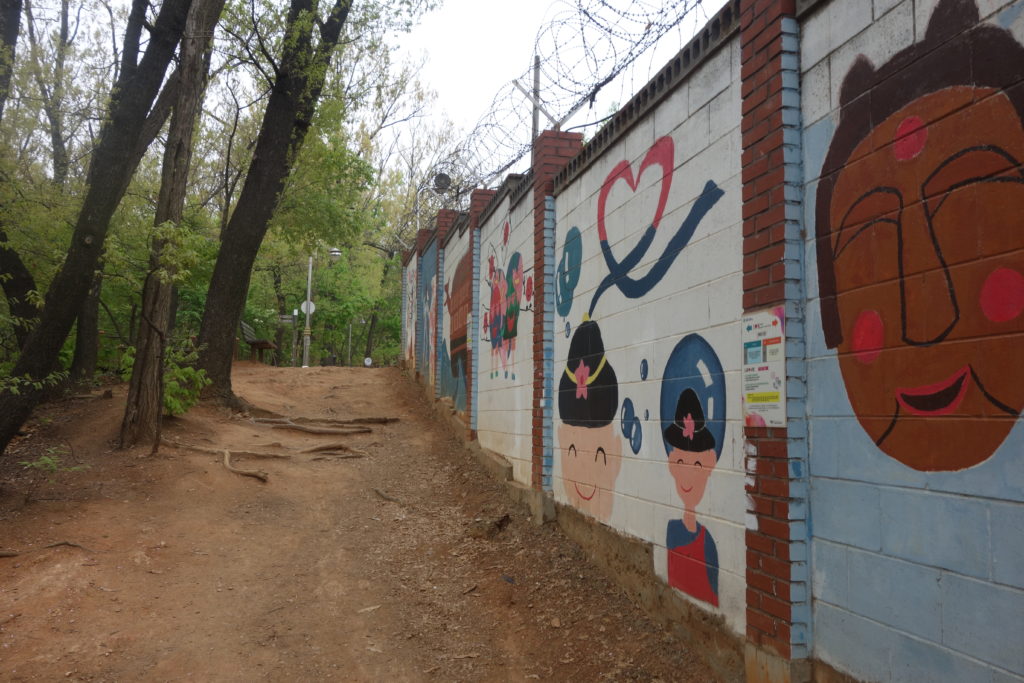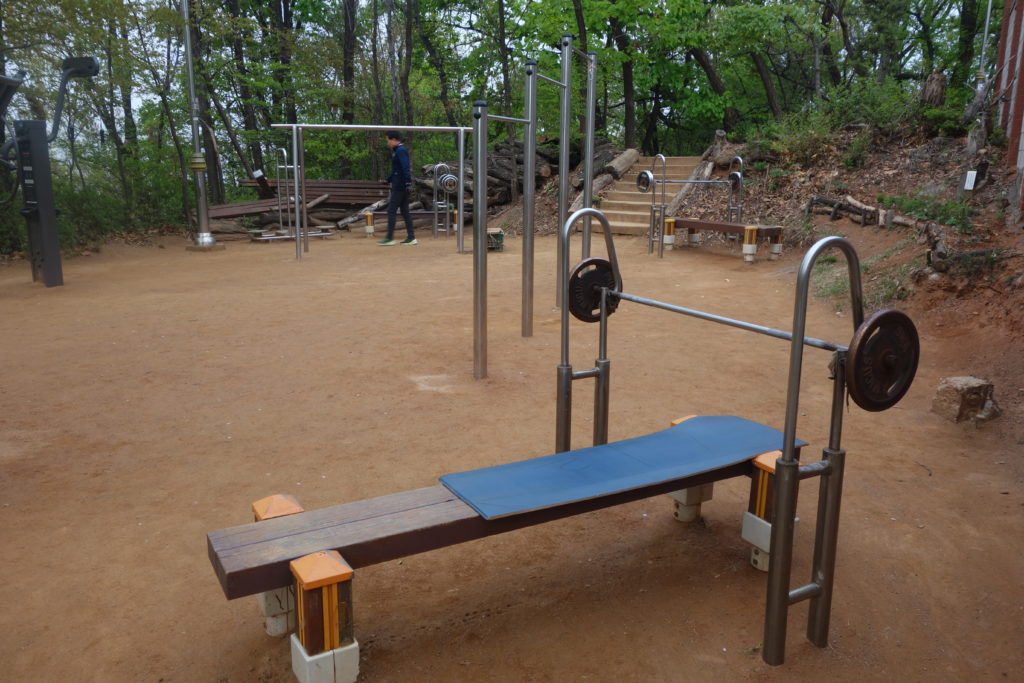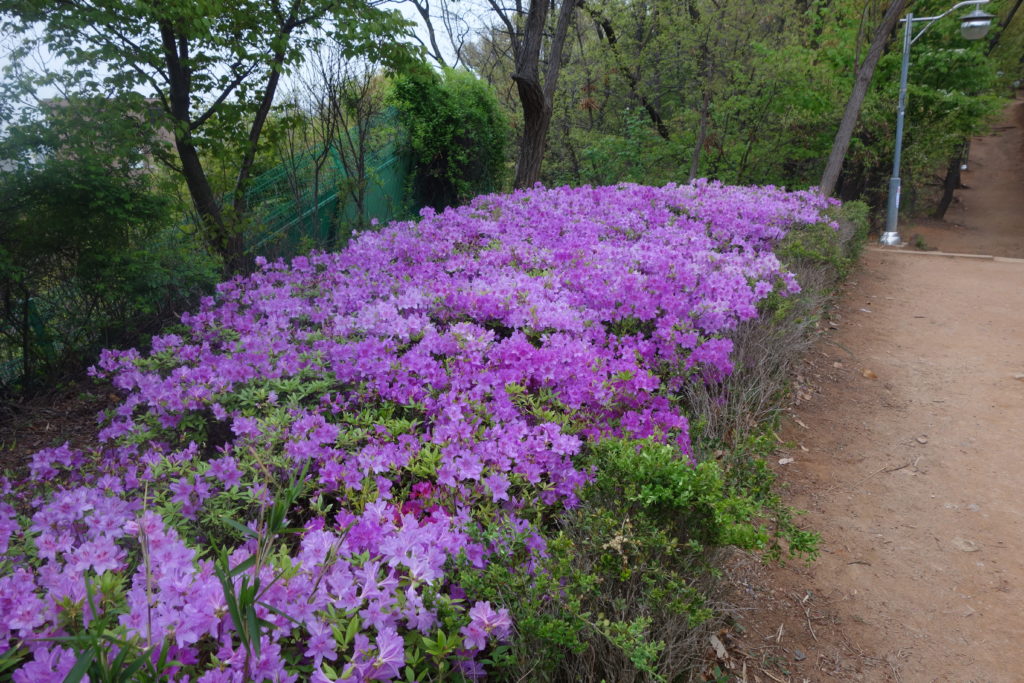Paddling through a pandemic of possibility in South Korea
Date- May 11, 2020

Written by George Balarezo, Intrepid Global Citizen
Beep! Beep! My stopwatch alarm clock sings its high pitched song as I pull a pair of sweats over my wiry, hairy legs and zip up my jacket. I wake up refreshed from a night’s sleep, as my body and mind warp themselves back to conscience reality. Mask strapped to my face, I push the cold metal doors of my Donjack Gu apartment open and am greeted by honking motorbikes, buses plopping over speedbumps, and the voice of a megaphone announcing garlic and onion prices to early morning shoppers. I trot up a hill past the morning hubbub ten minutes from my apartment door and arrive at the top of a small hill overlooking Seoul’s apartments, green hills, and pink skies. Today the outline of Samgaksan, the three-tiered mountain that makes up Seoul’s most trotted national park, lingers in the distance under musky white clouds that blot the burning sky. Cotton candy for the eyes amidst an onslaught of fiery pink and purple. The cool spring air is filled with floral scents of lavender. The aroma of freshly cut grass massages my nasal cavities with its foresty delight. White penny-sized cherry blossoms tinged with pink edges sway back and forth in the crystal breeze. A wrinkled woman half my size wrestles her way into a bush of purple flowers while her husband snaps a few shots. The woman’s smile radiates through her masked face, pushing her eyes into squinty sockets of delight.
In the midst of the COVID-19 pandemic, I have never felt better. I heave oxygen in the local park as I sprint up wooden staircases blanketed by pine trees and white flowers dangling from toothpick thin branches. I feel my lungs healing with every panting yell of pain it takes to suck in more air. The harder I breathe today, the more efficiently my lungs will repair themselves. This is my belief, even if nothing more than a placebo. I run extra laps today with ease and delight. I am so lucky to have this opportunity. An opportunity to suck in as much air as my lungs desire and brain decides. I know this won’t last forever. The only thing constant about history is change.
Once it’s all over, I cross my legs and I sit in a sun-soaked field of dry yellow grass with my eyes shut and observe the sensations of hunger, thirst, pulsating legs, and drops of sweat trickling down my forehead. Images of yellow and orange cloud my vision as the sun emerges from behind the skyscrapers. My mind is at ease and my breath slows to the optimal cadence to fill my brain with euphoria and clarity. My thoughts wander to the juicy oranges in my fridge, the video on persuasive speaking I have to upload for my students, and the book I want to finish reading. Then finally, my thoughts return to the task at hand, wishing all sentient beings peace, love, health, and positive energy.

Rewind to last spring, only 12 months ago. My eyes are bloodshot and I am wheezing for air. I cough as brain fog infests me with thoughts of aggression and rage. Why is that man staring at me? What made that taxi driver honk at a guy like me on a bike? How dare that old man smoke at the bus stop! I sprint home to escape its wrath. I lock the door, barricade my windows, and shut the blinds. It crashes through the barriers of my second-story apartment. The unwelcomed visitor pushes its way in. It surrounds me from all angles. I breathe. I lose. It stalks me, robs me from my freedom. My human rights are violated. Water, food, shelter- check. Inhale. Exhale. Cough. Cough. Yellow gobs of phlegm in my toilet bowl. I go outside. It’s there. I teach a class. It lingers all around me. I buy food at the market. It leaves dusty layers of filth on my spinach and broccoli. Its presence suffocates me.
Spring in South Korea, it used to be all honey-scented cherry blossoms every day ten years ago when I first arrived. Neighborhood mountains gifted visitors with spectacular views at any time of day. Scents of nature provided relief from stress-filled offices and study rooms. One could spend entire weekends outdoors, sleeping in tents at park entrances and mountain tops.
It all gradually changed. Factories, coal plants, Gobi desert wind storms, and economic activity all resulted in the downfall. Ten years ago yellow dust only visited the peninsula for one week per year during the spring, now yellow dust and fine particle reports are part of daily news reports, are displayed on Naver’s homepage (South Korea’s version of Google), and LED screens on highways.
I don’t need all the information, I have an internal air quality monitor that tells me how clean or filthy my lungs are and how cloudy my brain is. Wake up refreshed, clean air. Wake up fatigued, dirty air. Every day is different. Every day I wake up energized, I send more positive energy out to the world during my morning meditation session. Every day I wake up fatigued, I am a flustered mess, my mind sent into a tailspin of internal chaos. I cut my meditation sessions short as I sit and whither in a fiery storm of helplessness, anger, and sadness. The negative emotions are too much to take and I open my stinging eyes.
The government advises against exercise on bad days, but I do it anyway. At least my hormones will get straightened out, while my lungs take a punishment. It is a tradeoff I am willing to take. As I inhale fumes of dusty particles at the local park, I fume up an internal storm. I fume at the politicians who brought this to me. I fume at everyone who blames China in my neighborhood and shrugs their shoulders in helpless denial. I fume at myself for not doing more to prevent this catastrophe. Forget others. Forget others blaming others. It’s all my fault.

Spring is my season, I am Chunsam, meaning three times spring in Korean. I fell in love with my alter ego over ten years ago. Lately, that guy with the old fashioned name blows his smoke in my face and slaps me in my sleep until my eyes morph to sickly bloodshot balls of pain. My alter ego now wraps its hands around my neck and squeezes the years from my life with all its might. Where did our relationship go wrong? I desperately want to make things right again, but don’t even know where to start. We were supposed to be best friends forever, but now spring pollutes me and tears my heart in half.
Now that economic activities have halted all around the world, our flame bursts with renewed zeal. Mornings waking up with sore throats, red eyes, and brain fog have transformed into mornings waking up with a renewed zest to tackle the day and gratitude for the clean air I inhale.
The statistics tell a similar tale, according to the WHO 4.2 million people are killed each year by air pollution. The worldwide lockdown has resulted in a decrease in combustion of damaging petrol and diesel in cars and oil, coal, and gas in power plants. History tells us that the only time carbon dioxide emissions decrease is during periods of economic crises. Many public health experts claim that the reduction in air pollution-related deaths may offset the number of pandemic fatalities. In short, the coronavirus may actually be saving lives.
There is a price to pay for showing our devotion to the religion of modernity, whose foundational commandment is that economic growth is absolutely essential. Random acts of kindness, meditation, and taking a walk through a forested path on a sunny day are all free and run contrary to the dogmatic law that tells us we can solve all our problems by accumulating and producing more stuff. The system will never tell us “that is enough growth, you can take a break now.” You can’t monetize fresh air. You can’t put a price tag on pain- free eyes, healthy lungs, or mental clarity. As we have seen with the current pandemic, an ecological catastrophe could lead to an even more monumental economic ruin, political quarreling, and could render humans extinct.
If the ghosts of ancient hunter-gatherer societies could see us now, they would be scratching their heads in confusion. Look at how easy things are. People in the economically developed world don’t need to walk for an hour to the river to collect water, wash themselves and their clothes, or scavenge the land for food. Instead, we have dishwashers, supermarkets, water and light at the flip of a switch, yet are suffering from more depression, anxiety, and suicide than ever before.
Anthropologists studied the Hadza of Tanzania, one of the world’s last remaining foraging tribes who search the land for fruit, honey, and bush meat. They are on their feet for most of the day and are known to camp out close to water sources while staying up late into the night, awaiting the arrival of an animal to aim their poisonous arrow at and feast on. This tribe spends at least four to six hours per day moving across the savanna while dodging snakes that could render them blind with one shot of venom, lions who could tear them to shreds, and angry buffaloes who maul invaders of their territory. The most fascinating thing about this group of hunter-gatherers is not their ancient lifestyle, but the fact that anthropologists have been studying them since the 1960s and not one case of depression or suicide has ever been reported. Perhaps we should look to the Hadza for more wisdom on the good life.
The Hadza’s tale reminds me that we are now swimming in a pool of possibilities. A possibility to take a step back and return to the essence of human existence. The possibility to return back to purity, freedom, and clarity. Take in the deep gulps of fresh air that were so rare before this all started. Free yourself from hyper-consumerism and modernism, the invisible contracts we were forced to sign at the subliminal level for being born during this time in history. Emerge not as a victim, but empowered with greater clarity. Actualize a more fulfilling life experience. Take time to pause and be grateful for the people you have in your life, no matter how imperfect they may be. Be liberated by human connection and fresh air all around you. Be intoxicated by the potential for global cooperation and world peace having common problems to tackle can create. Go inward and overcome the fear of the inability to control what is happening around you. Remember that control is always an illusion and all we have is this moment and the choices it presents. Invest your time in the things you can control- eat better food, get better sleep, move your body more. Break the behaviors and reactions that don’t serve you.
Life can beat on us with its brass knuckles. People become ill and pass on, jobs and fortunes lost overnight. Remember there are heroes walking among us on every corner treating the ill and providing food and necessities for the masses. Don’t let this pass without reflection. Be the hero to yourself or your neighbor. Be the possibility and bring back the purity.
